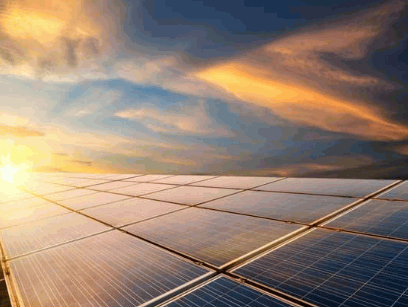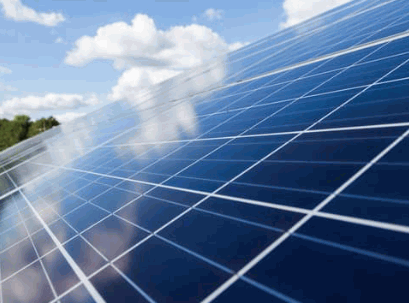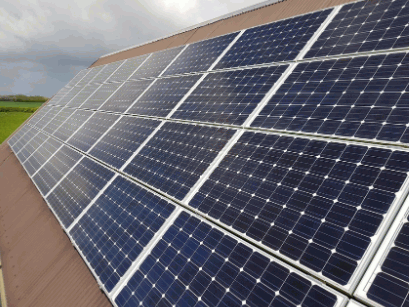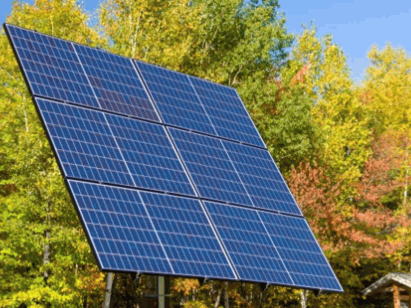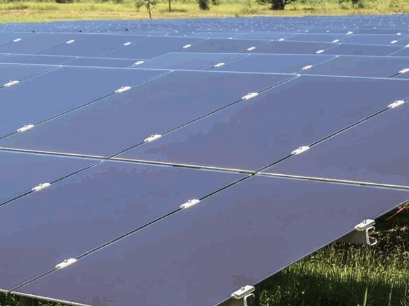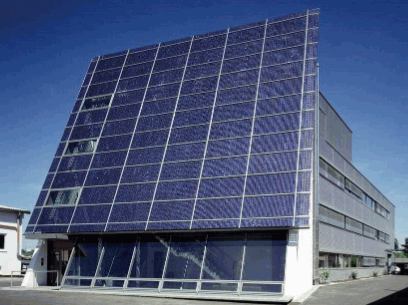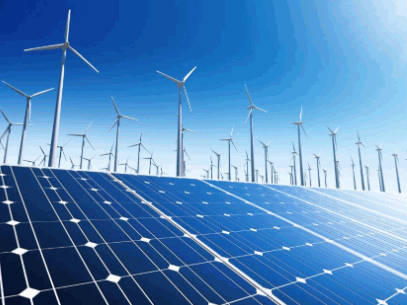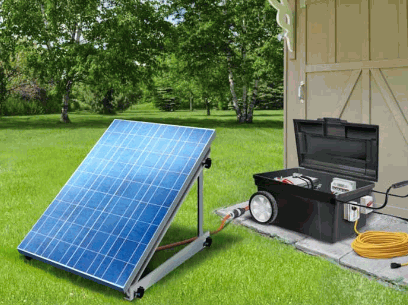Have you ever wondered about the mysterious technology behind solar panels? In a world where energy consumption is a growing concern, understanding how solar panels work and their benefits is crucial. So, let's unravel the complexities and shed light on the importance of solar panels for a sustainable future.
What Are Solar Panels?
Solar panels are devices that convert sunlight into electricity. Made up of multiple solar cells, they capture the sun's energy and produce direct current (DC) electricity. This electricity can be utilized to power homes, businesses, and other applications. Solar panels are a sustainable and eco-friendly energy solution, providing a renewable option to traditional fossil fuels.
If you're thinking about installing solar panels on your home, it's important to evaluate your energy requirements, property suitability, and any available incentives or rebates.
How Do Solar Panels Work?
- Sunlight hits the solar panels, composed of photovoltaic (PV) cells.
- Photons from the sunlight are absorbed by the silicon cells, causing electrons to become detached from their atoms.
- Electrical conductors capture the electrons, creating an electric current.
- An inverter converts the direct current (DC) into alternating current (AC) for use in residential or commercial buildings.
Pro-tip: To ensure maximum efficiency and longevity, it is important to regularly clean and maintain solar panels.
What Are the Different Types Of Solar Panels?
Solar panels, also known as photovoltaic (PV) panels, are rapidly gaining popularity as a sustainable and cost-effective energy source. But did you know that there are different types of solar panels? In this section, we will discuss the various types of solar panels available in the market and their unique features. From the highly efficient monocrystalline solar panels to the flexible and lightweight thin-film solar panels, we will explore the different options and their benefits. So, let’s dive into the world of solar panels and discover which type is best suited for your energy needs.
1. Monocrystalline Solar Panels
- Monocrystalline solar panels, made from single-crystal silicon, offer high efficiency.
- To determine the number of panels required, assess your energy needs.
- For optimal sunlight exposure, consider your roof's space and orientation.
- Ensure proper installation and integration with your electrical system by consulting with a professional.
2. Polycrystalline Solar Panels
- Polycrystalline solar panels are produced by melting raw silicon, pouring it into a square mold, and then allowing it to cool.
- These panels have a less uniform silicon crystal structure, making them more affordable but less efficient than monocrystalline panels.
- Installation involves securing the panels to the roof using racks, connecting them to create a circuit, and wiring the system to an inverter.
3. Thin-Film Solar Panels
Thin-film solar panels are a lightweight and flexible option, making them perfect for a variety of applications including solar farms, residential rooftops, and commercial buildings. They are simple to install and perform well in low light conditions, although their efficiency is typically lower than that of crystalline silicon panels.
Fact: Due to their cost-effectiveness and versatility, thin-film solar panels are frequently utilized in large-scale solar projects.
4. BIPV Solar Panels
BIPV (Building-Integrated Photovoltaics) solar panels are incorporated into a building's construction elements, such as the roof or facade. These panels serve a dual purpose by functioning as both a building material and a power generator, seamlessly blending with the structure's design.
When considering BIPV solar panels, it is important to evaluate the compatibility with the building's architecture, energy generation capacity, and long-term cost-effectiveness.
To achieve the best results, it is recommended to consult with a solar panel expert to assess the suitability of your property for BIPV installation.
What Are The Benefits Of Using Solar Panels?
Solar panels are a popular and rapidly growing form of renewable energy. But what exactly are the benefits of using solar panels? In this section, we will discuss the numerous advantages of utilizing solar panels as a source of electricity. From reducing electricity costs to promoting environmental sustainability, solar panels offer a range of benefits that make it a highly desirable option for energy consumption. Additionally, we will also explore the various government incentives available for those who choose to go solar.
1. Renewable Energy Source
Renewable energy sources, such as solar panels, offer a sustainable solution for power generation. Here are the steps for harnessing this eco-friendly energy:
- Evaluation: Assess your energy needs and budget for installing a renewable energy source.
- Research: Explore different options for solar panels, taking into consideration their efficiency and durability.
- Consultation: Seek advice from experts in solar energy to determine the best fit for your property.
- Installation: Choose to hire professionals or take a DIY approach, following all necessary safety guidelines.
By taking into account factors such as location, sunlight availability, and financial incentives, you can maximize the benefits of utilizing a renewable energy source.
2. Cost Savings On Electricity Bills
When considering the benefits of using solar panels, the potential cost savings on electricity bills play a significant role. By harnessing solar energy, households can significantly reduce their reliance on traditional grid electricity, leading to substantial long-term cost savings.
Furthermore, with advancements in technology and increased government incentives, the initial investment in solar panels is becoming more accessible, making cost savings on electricity bills an increasingly attractive prospect for many homeowners.
For those contemplating the installation of solar panels, evaluating the potential cost savings on electricity bills is a crucial factor in the decision-making process. It's essential to conduct thorough research and seek professional advice to fully understand the long-term financial benefits.
3. Environmental Benefits
- Reduction in greenhouse gas emissions
- Conservation of natural resources
- Decreased air and water pollution
Pro-tip: Regularly clean solar panels to maintain efficiency and maximize the environmental benefits of using renewable energy.
4. Government Incentives
- Research: Explore federal, state, and local incentives, such as tax credits, rebates, and grants for potential government incentives.
- Eligibility: Check eligibility criteria, ensuring compliance with installation and equipment standards for qualification.
- Application: Complete necessary paperwork, submitting applications within specified deadlines for government incentives.
- Documentation: Gather required documentation, including proof of purchase and installation, for government incentive programs.
What Are The Factors To Consider Before Installing Solar Panels?
Before making the decision to install solar panels, there are several key factors that must be considered. These factors will determine the success and effectiveness of your solar panel system. In this section, we will discuss the various factors that should be taken into account, such as the location and sunlight availability, roof suitability, cost and financing options, as well as maintenance and warranty. By understanding these considerations, you can make an informed decision about whether solar panels are the right choice for your home.
1. Location And Sunlight Availability
- Evaluate the amount of direct sunlight your location receives throughout the year.
- Consider any potential obstructions that may block sunlight from reaching the solar panels, such as nearby buildings or trees.
- Analyze the positioning of your roof and its angle to ensure optimal sunlight exposure for the solar panels.
- Consult with a professional to conduct a solar site analysis for precise sunlight availability.
The use of solar power dates back to the 7th century B.C., when magnifying glasses were used to concentrate the sun's rays to create fire. In the nineteenth century, the first solar cells were developed, marking the beginning of modern solar power technology.
2. Roof Suitability
- Evaluate the orientation and angle of your roof to ensure optimal exposure to sunlight.
- Assess the condition of your roof to determine if it is capable of supporting solar panel installation.
- Take into consideration any potential shade from nearby trees or buildings that could impact the efficiency of your solar panels.
- Consult with a professional to conduct a structural analysis and evaluate the suitability of your roof for solar panels.
Prior to proceeding with solar panel installation, it is essential to thoroughly inspect the suitability of your roof in order to maximize energy generation and ensure the longevity of your system.
3. Cost And Financing Options
- Research Financing Options: Explore loans, leases, or power purchase agreements to determine the most cost-effective approach for installing solar panels.
- Government Incentives: Investigate tax credits, rebates, and other financial perks available at the federal, state, and local levels to help offset the cost.
- Consider Maintenance Costs: Account for potential maintenance expenses when evaluating the overall cost of owning and maintaining solar panels.
- Evaluate Return on Investment: Calculate the long-term financial benefits of solar panel installation to make an informed decision on whether it is a worthwhile investment.
4. Maintenance And Warranty
- Regular Cleaning: Keep your panels clean by removing dirt and debris, which can improve their efficiency.
- Inspection: It's important to regularly check for any damage or wear and tear, especially after experiencing extreme weather conditions.
- Warranty Review: Make sure to thoroughly review the terms of your warranty, including the coverage period and any specific conditions.
- Professional Maintenance: Consider scheduling professional check-ups to ensure that your panels are performing at their best.
By following these maintenance steps, you can help extend the lifespan and efficiency of your solar panels, ultimately maximizing your energy savings.
Uncover more: How To Clean Solar Panels
How Can One Install Solar Panels?
For those looking to switch to renewable energy sources, solar panels are a popular and effective option. But the question remains, how can one install solar panels? In this section, we will discuss the two main methods for installing solar panels: DIY installation and professional installation. Whether you prefer a hands-on approach or would rather leave it to the experts, we will cover the key points of each method to help you make an informed decision.
1. DIY Installation
- Evaluate solar potential: Assess your location's sunlight exposure and shading to determine if it's suitable for a DIY solar panel installation.
- Understand local regulations: Check local building codes, zoning laws, and HOA restrictions before commencing the DIY installation.
- Choose equipment: Select appropriate solar panels, inverters, and racking based on your energy needs and roof type.
- Installation: Secure panels to the roof using DIY racking, connect panels to inverters, and link the system to your electrical service.
- Inspection: Have the DIY installation inspected by a qualified professional to ensure compliance with local codes and safety standards.
2. Professional Installation
- Assessment: Contact professional solar panel installation companies to assess your home's energy needs and roof suitability.
- Design Proposal: After assessment, companies will provide a detailed design proposal, including system size, placement, and expected energy production.
- Permitting and Approval: Once the design is finalized, the company will obtain the necessary permits and approvals from local authorities.
- Professional Installation: Experienced installers will mount the panels, connect the electrical components, and set up the monitoring system.
- Inspection and Connection: After installation, the system will be inspected to ensure compliance with regulations, and then connected to the grid.
- Maintenance: Professional installers often offer maintenance plans to ensure the system continues to operate efficiently.
